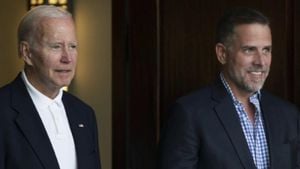Major negotiations aimed at establishing the world's first comprehensive treaty addressing plastic pollution have failed to reach agreement during recent talks held in Busan, South Korea. Over the course of the week-long discussions, representatives from nearly 200 nations sought to finalize commitments to reduce plastic production and curb pollution; unfortunately, they ended early on December 2, recognizing substantial ideological divides among participating countries.
This effort, which was initially met with optimism, was marked by stark disagreements over how to tackle the growing crisis of plastic waste, which significantly impacts oceans, wildlife, and human health. Environmental advocates had hoped these negotiations would lead to enforceable measures to reduce plastic production and phase out harmful chemicals, but the discussions were overshadowed by resistance from nations reliant on oil production, which is the primary feedstock for plastics.
At the heart of this standoff were two opposing groups: "high ambition" countries, including members of the European Union and several island nations vulnerable to marine pollution, versus oil-producing states like Saudi Arabia and Russia, who insisted on limiting the treaty’s language about production and chemical phase-outs. These 'like-minded' nations argued against language restricting plastic production, viewing such measures as threats to their economic interests.
The chair of the negotiations, Luis Vayas Valdivieso, noted the group's progress but also confirmed their challenges. “While we achieved significant advancements, the work is still incomplete,” he stated during the final plenary. There was acknowledgment of the draft treaty's complexity, which had grown to over 70 pages filled with conflicting provisions. Critics argued this lengthy and convoluted document exemplified the deeply entrenched disagreements present among the countries.
The United Nations Environment Programme’s Executive Director, Ingrid Andersen, emphasized the progress achieved, asserting, “What we do have is very, very good progress,” even as talks collapsed. She characterized the ambitions set out years prior as “highly ambitious,” indicating there remains substantial work to be done.
Despite the relatively optimistic appraisal from UN officials, other stakeholders were much less sanguine. Environmental groups expressed anger and frustration, contending the negotiations were effectively 'held hostage' to the political will of oil-producing nations. Juliet Kabera, the Rwandan delegate, voiced her disappointment, stating her nation could not endorse what she called "a toothless treaty".
“We need actionable agreements, not just words,” Kabera stressed, indicating growing frustration over elements of the treaty perceived to be too weak.
Protesters joined the dialogue outside the conference, rallying around messages advocating for bold action against plastic pollution. These activists aligned with Kabera’s sentiments, carrying signs with slogans such as “Courage not compromise,” demanding nations work together to curb plastic pollution rather than sidestep responsibility.
Despite ending without agreement, the assembly also paved the way for future discussions. A new draft was presented as the basis for upcoming talks, with representatives committing to continue the dialogue and seek common ground moving forward. No date has yet been set, but parties seem divided on the quick resumption of negotiations, with some delegations calling for delays until 2025.
What becomes evident from the discussions is the urgent need for comprehensive and coordinated action against plastic pollution. The latest reports indicate over nine out of ten pieces of plastic are not recycled, leading to dire consequences for ecosystems across the globe. The calls for addressing plastic pollution reflect broader concerns about environmental degradation and prioritize the development of sustainable alternatives to single-use plastics.
Negotiators cited numerous barriers to consensus, with countries engaging on both sides exhibiting unwavering positions on production limits and chemical bans. This gap has sparked concern among environmental advocates about the efficacy of any potential treaty without meaningful restrictions on production and stringent chemical regulations.
Next steps remain uncertain, but with plastic production projected to triple over the next few decades, there's immense pressure on world leaders to bridge these gaps. Anderson remained hopeful, declaring, "There's no point in meeting again without seeing pathways to viable text. We need to come prepared to take decisive steps toward addressing this urgent crisis.
Future summits now hinge upon the collective acknowledgment of the plastic pollution crisis and the political will to implement effective solutions. The pressure is on, as communities around the globe anticipate substantial changes to curb plastic pollution and protect the planet’s natural resources.
"Finding common ground can sometimes take time, but we must remain committed," Andersen concluded, reflecting the resolve and determination many advocate are hoping will fuel these negotiations moving forward. The fate of global action against plastic pollution hangs precariously, signaling the need for immediate and united efforts to turn intentions and discussions, many feel, have dragged for too long, toward real environmental change.



